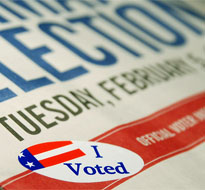Exit polls are surveys conducted as voters leave their polling place on Election Day. Reaching voters at that moment is important because it overcomes the problem pollsters have conducting telephone polls: people tend to misreport whether they voted or not. The “who won and why did they win” coverage on election night, of course, comes mainly from these exit poll results.
A 2008 paper from Harvard’s Shorenstein Center, “Exit Polls: Better or Worse Since the 2000 Election?” reviews the history of exit polls and examines their evolution and emerging problems. The paper was authored by Robin Sproul, a Shorenstein Fellow and then Vice President and Washington Bureau Chief, ABC News.
Key points in the paper include:
- “In general, people are less inclined to respond to polls than they used to be. This trend impacts all kinds of polling methodologies, but is evident in the declining willingness to respond to exit polls as well. In their reviews of the 2000 election coverage, the news organizations expressed concern about the declining response rates.”
- “In reviewing their 2000 election coverage, the networks expressed concern about the growing number of absentee/early voters nationwide and the potential impact on the accuracy of future exit polls. The underestimation of the 2000 Florida absentee vote numbers was a contributing factor to the exit poll problems in that state.”
- “Although the response rate alone does not cause survey error, with a lower response rate there is a correspondingly higher risk of non-response bias…. In 2004, precinct level exit poll results overstated the Kerry-Bush difference by 6.5 points in favor of Kerry. In 2006, the exit poll’s Democratic-Republican margin was overstated in favor of the Democrats by 6.2 points.”
- “The leaking of early and only partially weighted exit poll numbers in 2004 caused much public confusion. Those numbers appeared on multiple internet sites on Election Day, and they indicated a strong showing for John Kerry. Some sites crashed because of the heavy traffic, with the Drudge Report, Slate, and others seeing huge increases in visitors. Early exit poll data had leaked onto the internet in 1996 and 2000, without much public notice. In 2004, the prevalence of political blogs and increased web traffic caused the data to move among sites at lightening speed, reaching millions of people. Most of those people had little contextual understanding of the data.”
“With the changing ways Americans are voting,” the paper concludes, “the many problems associated with all types of polling, the ability to provide deep and instant data to individual news consumers on the Internet, and the ability to use the internet to reach individual voters, there are challenges and opportunities for new ways to measure election results that did not exist in the 1960s. The challenges include finding new ways to survey a large sample of representative American voters, whether they vote early or on Election Day, in order to tell a timely and accurate story about election results. A concomitant challenge for the news organizations involved is finding ways to financially support these efforts.”


Expert Commentary